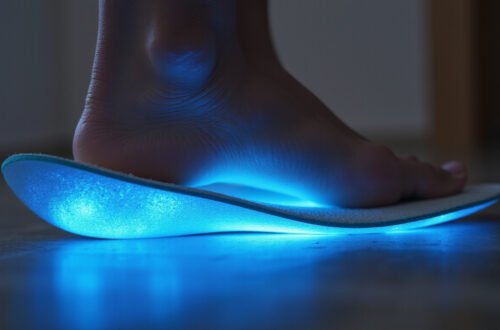Leg numbness can be a perplexing and often alarming symptom that affects many individuals at various points in their lives.
This condition can manifest in several ways, such as a tingling sensation, a ‘pins and needles’ feeling, or a complete loss of feeling in the leg.
Understanding leg numbness is essential to identifying its causes and finding effective remedies.
In this article, we’ll delve into what leg numbness is, explore its common causes, and examine associated symptoms.
We’ll also discuss when it’s crucial to seek medical attention, provide practical home remedies and lifestyle changes to alleviate discomfort, and highlight preventive measures to help you avoid leg numbness in the future.
Your Sciatica Pain-Free Future Starts Here – Click to Learn More!
Key Takeaways
- Leg numbness can result from various conditions affecting nerves and blood circulation.
- Common causes include sciatica, diabetic neuropathy, and prolonged pressure on nerves.
- Symptoms may range from tingling sensations to complete loss of feeling in the leg.
- It’s crucial to seek medical advice if numbness persists or is accompanied by other severe symptoms.
- Lifestyle changes and home remedies can help alleviate mild leg numbness and prevent future occurrences.
What is Leg Numbness?
Leg numbness is a condition characterized by a loss of sensation or a tingling feeling in the legs.
It can be caused by various factors, including nerve compression, poor circulation, or underlying health issues.
For instance, sitting or standing in one position for an extended period can compress nerves in the legs, leading to temporary numbness.
More serious causes may include conditions like diabetes, multiple sclerosis, or a herniated disc that affects the spinal cord’s ability to send signals to the legs.
Understanding leg numbness and its causes is crucial for determining the appropriate course of action if you experience this unsettling symptom.
Common Causes of Leg Numbness
Leg numbness is a condition that affects many individuals at some point in their lives, but understanding the common causes can help you address the issue effectively.
One of the primary culprits of leg numbness is poor circulation, which may result from conditions such as peripheral artery disease or diabetes.
Another frequent cause is nerve compression, often seen in conditions like sciatica or herniated discs, where the nerves in the lower back become pinched.
Additionally, vitamin deficiencies, particularly B12 deficiencies, can lead to neurological symptoms, including numbness.
Other factors like prolonged sitting or standing, excessive alcohol consumption, and certain medical conditions such as multiple sclerosis or stroke can also contribute to the sensation of numbness in the legs.
By being aware of these common causes of leg numbness, individuals can take proactive steps to seek treatment and improve their overall health.
‘The human body is the best picture of the human soul.’ – Ludwig Wittgenstein
Identifying Symptoms Associated with Leg Numbness
Leg numbness can often be a perplexing and unsettling experience.
Identifying the symptoms associated with leg numbness is crucial in determining the underlying cause and seeking appropriate treatment.
Common symptoms may include a tingling sensation or ‘pins and needles’ feeling, weakness in the legs, or even a complete loss of sensation.
Additionally, some individuals may experience pain that accompanies the numbness, which can vary in intensity depending on the severity of the condition.
It’s essential to pay attention to whether the numbness is persistent or intermittent, as this information can provide valuable clues to healthcare professionals.
If you find yourself experiencing leg numbness frequently, it is wise to consult a doctor to discuss your symptoms and explore possible causes.
Your Sciatica Pain-Free Future Starts Here – Click to Learn More!
When to Seek Medical Attention
Leg numbness can be a concerning symptom, and knowing when to seek medical attention is crucial for your health.
If you experience sudden leg numbness, especially if it is accompanied by other symptoms such as weakness, confusion, trouble speaking, or issues with coordination and balance, it is important to consult a healthcare provider immediately.
These signs may indicate a stroke or other serious condition.
Additionally, persistent leg numbness that lasts for more than a few minutes or recurrent episodes can also signal underlying issues, such as nerve compression or circulatory problems, and should be evaluated by a doctor.
Don’t hesitate to seek help if you notice changes in sensation, as early intervention can make a significant difference in treatment outcomes.
Home Remedies and Lifestyle Changes for Relief
If you’ve been experiencing leg numbness, you’re not alone.
Many individuals encounter this sensation at some point in their lives, which can stem from various causes like poor circulation, nerve compression, or even prolonged sitting.
Fortunately, there are numerous home remedies and lifestyle changes that can help alleviate leg numbness and improve your overall comfort.
First and foremost, regular exercise is crucial; engaging in activities such as walking, swimming, or yoga can enhance blood flow and reduce symptoms.
Additionally, incorporating stretches specifically targeting the legs may relieve tension in your muscles and nerves.
Staying hydrated is essential too, as dehydration can contribute to cramping and numbness.
Moreover, consider making dietary changes by including more vitamins and minerals, such as potassium and magnesium, which are vital for nerve health.
Finally, be mindful of your posture, especially if you spend long hours sitting.
Taking frequent breaks to stand, stretch, or walk around can significantly ease leg numbness and promote better circulation.
FAQs
What is leg numbness?
Leg numbness is a sensation characterized by a lack of feeling or a tingling sensation in the legs, often caused by nerve compression, poor circulation, or other underlying health conditions.
What are the common causes of leg numbness?
Common causes of leg numbness include sciatica, herniated discs, peripheral neuropathy, diabetes, multiple sclerosis, and poor circulation due to long periods of sitting or standing.
What symptoms are associated with leg numbness?
Symptoms that may accompany leg numbness include tingling or prickling sensations, weakness in the legs, a feeling of heaviness, or pain.
In some cases, there may also be swelling or changes in skin color.
When should I seek medical attention for leg numbness?
You should seek medical attention if leg numbness is accompanied by severe pain, sudden weakness or paralysis, loss of bladder or bowel control, or if the numbness persists or worsens over time.
What home remedies can help alleviate leg numbness?
Home remedies for leg numbness include regular exercise to improve circulation, stretching and yoga to relieve pressure on nerves, staying hydrated, and using warm compresses to relax tense muscles.






